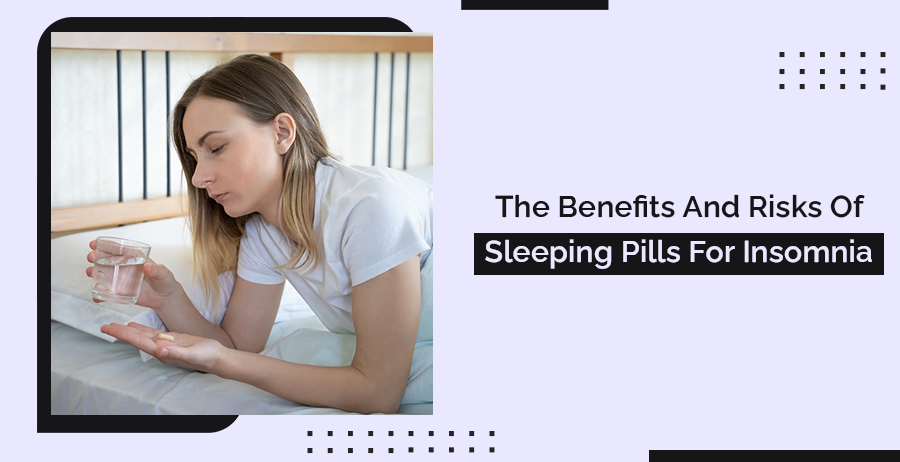Table of Contents
The Benefits and Risks of Sleeping Pills for Insomnia
Overview:
Getting a good night’s sleep can be challenging, but you are not alone.
According to a new study by the American Academy of Sleep and Medicine, nearly two-thirds of Americans are taking sleep pills.
Approximately one-third of adults have insomnia, one of the most common sleep disorders. There are many ways to treat insomnia, including sleeping pills.
As long as they are used properly, sleep pills can aid in falling asleep quickly, staying asleep, and allowing you to get restorative sleep of high quality.
Despite this, many individuals develop dangerous habits when they use sleeping pills. We will know The Benefits and Risks of Sleeping Pills for Insomnia.
If you want to get the most benefit from sleep pills while minimizing the side effects, you should know how to use them appropriately.
Continuing reading will provide you with information about how to follow the best practices when taking sleeping pills and how to minimize the risks of side effects.
Is it safe to use sleeping pills?
If taken according to the instructions, sleep pills are usually safe for short-term use when taken by healthy adults.
Nevertheless, because of the possibility of side effects, it’s always best to take any sleep aid under the supervision of a healthcare professional who can review your situation and discuss the benefits and risks of specific sleep pills.
- Some health problems, including closed-angle glaucoma, peptic ulcers, and urinary retention, should not be treated with diphenhydramine and doxylamine.
- Pregnant or breastfeeding women are also at risk from sleep pills.
- Poses a risk to people over the age of 65, including an increased risk of dementia.
It is not possible to identify a sleep aid that is universally considered to be the safest. Depending on your health situation, medicines may pose a greater risk.
Sleep aids: How effective are they?
There is no magic treat for insomnia with sleep pills. It is true, however, that they can be effective.
For a situation of a sleepless night, sleep pills such as Zopisign 10mg are available with a prescription.
A majority of sleep pills available over the counter contain antihistamines. There is a possibility that tolerance to antihistamines’ sedative effects may develop quickly.
Taking them for a longer period will have a lesser effect on your ability to sleep.
Benefits of sleeping pills
The primary benefit of most sleep aids is the induction of drowsiness, which increases your chances of falling asleep and remaining asleep throughout the night.
Several sleep aids can alleviate daytime drowsiness and impaired thinking associated with sleep deprivation in the short term.
You may obtain a better amount of sleep by resetting your sleep schedule. Most sleep aids, however, are not intended to be used for an extended period.
A sleep disorder such as insomnia is often treated with a sleep aid combined with practical measures, such as improving sleep hygiene, to help you get a good night’s sleep.
Risks of Sleeping pills
It is possible that side effects may vary depending on the specific sleep aid and whether the person taking it has any other health problems or medications Zopisign 7.5mg (Zopiclone).
All sleep medications have the potential to cause adverse side effects; however, some sleep aids are more likely to cause these adverse effects than others:
- Effects that linger the next day
- Incoordination or confusion
- Abnormal behavior
- Allergic reaction
💊Insomnia medications: Are they bad for you?
Sleeping pills are one of the most effective ways to treat insomnia. It is important to note, however, that these medications can be habit-forming and carry a risk of side effects.
Using sleep pills as a treatment for insomnia is not recommended by the American Academy of Sleep Medicine.
Among the first lines of treatment for chronic insomnia are sleep hygiene (habits that promote sound sleep) and cognitive behavioral therapy (behavioral changes).
Even so, short courses of sleep medications can prove extremely beneficial in managing acute insomnia, teaching a person to practice good sleep hygiene and develop healthy sleep habits.
How safe is it to take sleep pills every night?
According to experts, sleeping pills are an effective short-term remedy.
Insomnia caused by temporary conditions such as jet lag or situations such as divorce or death should be treated with these medications.
There is no need to use sleep aids on a long-term basis. Regarding safety and efficacy, there is limited information available when the tablet is used for an extended period.
There may be adverse effects on sleep stages and quality when medications are taken daily.
Evidence suggests that long-term use of sleep medications is associated with an increased mortality rate.
Taking sleeping pills regularly can lead to tolerance, which means you will need to take higher doses to achieve the same results.
Also, if used daily for a prolonged period, sleep aids can develop a habit.
Sleeping medications can lead to addiction and withdrawal symptoms, such as rebound insomnia, irritability, anxiety, and strange dreams when the user attempts to discontinue the medication.
What is the safest way to take a sleep aid?
Whether you are considering a sleep aid or not, you should consult your physician before beginning any treatment.
Doing so can determine whether you have insomnia or another sleep disorder.
Additionally, your physician will provide the appropriate treatment and guidance to ensure you receive the greatest benefit from the prescription while minimizing any side effects.
The best time to take sleep medication is right before you go to bed. There is a risk of interference with activities in the evening hours if you take these medications too early.
When I have trouble sleeping, where should I start?
Make sure you start by speaking with your healthcare provider.
You will be required to inform your doctor about any existing mental or physical health concerns before they prescribe a specific sleeping aid.
Ensure it will not interfere with any other medications you are taking. A sleep aid may not be the best solution for some people to achieve better sleep.
Many non-medical treatments can be effective, and your healthcare provider can provide information regarding medical and non-medical options.





